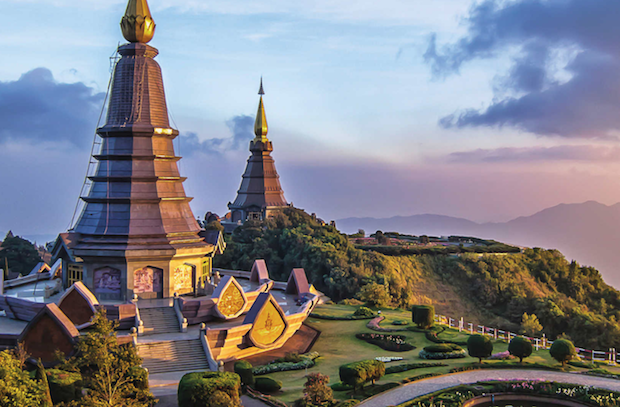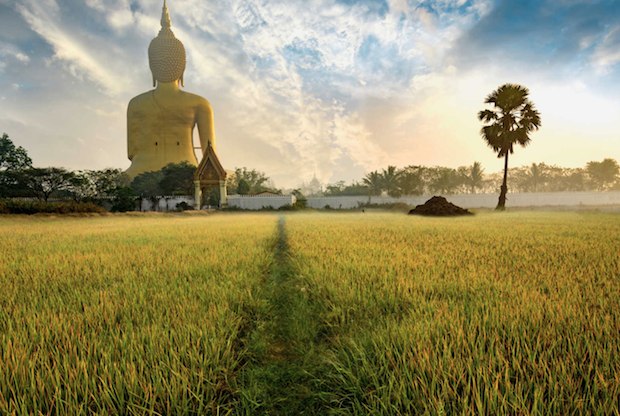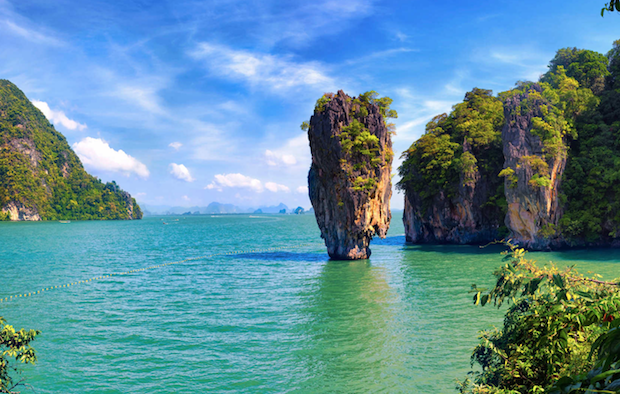A honeymoon in Thailand is high on a lot of couples' wish lists. It's a diverse country, with lots to see and do, whether you want to eat your weight in street food, flake out on a beach, or explore temples and get in touch with your spiritual side. And it's affordable too, meaning lots of baht for your buck.
But as with anywhere hot, tropical and exotic, Thailand has its hazards. So, we're bringing you a series of travel health guides filled with expert advice on travelling to some of the world's most sought-after honeymoon destinations. Before you start planning your snorkelling trip or practising your Thai, read our expert guide on what vaccines you need to get before you go Thailand, and how to stay healthy and safe while you're there.

Preparing to Travel to Thailand
We often get asked for advice on booking trips. There are so many options available now to suit every requirement and budget and often if you are tight for dates with wedding leave, you may prefer to just arrange your own. Make sure your travel agents and tour operators have membership with an approved body such as the Federation of Tour Operators (FTO).
Before you travel, be as organised as possible and get as much rest as you can before your trip. It is a long flight to Thailand (about 12-14 hours), so you will be tired when you arrive especially if you are
travelling immediately post-wedding.
- Try your best to rest on the plane. Avoid stuffing yourself, or drinking too much coffee or fizzy drinks
- Take a few days to acclimatise on arrival, especially to the heat. Allow your body to catch up and try to leave any heavy activities until later in your trip
- Check the weather forecast before you go and pack accordingly. Be prepared for increased humidity and if you will be in rural areas with limited access to bottled water, plan if you want to buy a water filter or water purification tablets before you go

Travel Insurance for Thailand
As with any trip, it's important to buy the right travel insurance before you go on honeymoon. It's your responsibility to ensure you can cover the cost of any medical treatment while you are abroad and the right travel insurance will ensure you can do so. The embassy, high commission or consulate in the country you're visiting will not pay these costs.
Your honeymoon travel insurance should cover:
- Emergency medical treatment costs, including hospital fees and ambulance charges
- Returning you to the UK following medical treatment abroad if you cannot use your original flight ticket (look for the word 'repatriation' on the policy)
- Transport and/or accommodation expenses for a close relative or friend to stay with you or travel from the UK to escort you home if required
- 24/7 help-lines to offer support and advice
Make sure you answer any questions from your insurance provider about your medical history fully and honestly as withholding details of your medical history may mean you are not fully covered when it will matter most.

When you're booking an expensive holiday such as a honeymoon or destination wedding in advance, you may want to ensure that you can recover the costs if you are unable to travel. Check that any cancellation cover limits meet the full cost of your holiday and look for any excesses. If your trip is cancelled or significantly delayed, you may be entitled to compensation from the airline or a refund from the travel provider.
Insurance can allow you to claim unused travel and accommodation costs that you are unable to recover elsewhere.

The Best Time of Year to Travel to Thailand
Thailand is located between vast areas of land and water, so it is impacted by both the summer and the winter monsoons. The average temperature in Thailand ranges from 18 to 38°C.
The dry season is from the middle of February to the middle of May, with April being the hottest month. Interesting places to visit during this period are beaches and islands in the South and the East of Thailand.
The wet or rainy season starts from the middle of May to the middle of October, when rain will become less frequent and the weather in upper Thailand, especially the North and the Northeast, will get cooler, while rain in the South will continue until December.
Popular activities during this time of the year include visiting hills and mountains and enjoying scenery of rice terraces in the North, which will look different from the cool season.
The cool season is from the middle of October to the middle of February. Checking the weather before planning where to visit is vital to the success of your trip. While some places in Thailand can be visited at any time of the year, some are best during particular periods. For example, if a clear sky, bright sun, and blue sea are your things, you should definitely travel to Thailand in the dry season.
Koh Samui weather is perfect for beach lovers during summer. But for mountain lovers, the recommended period is the cool season when there are cooling breezes and beautiful flowers for you to enjoy. The wet season in Thailand offers visitors lush greenery and spectacular views.

Keeping Safe While on Honeymoon in Thailand
Thieves tend to work in many of the tourist areas: crowded airports, local transport and in market places, so stay aware of these risks and be careful not to flaunt personal wealth or new wedding gifts! Use hotel safety boxes for any personal effects where possible and particularly take care when swimming or at any time when your valuables are out of sight for even a short time.
The night life in Thailand is very energetic and enjoyable but dangers can be overlooked! Being alone is a particular risk and while travelling as a couple try to ensure you get to know other couples and go out as a group, or make sure you stay together where possible.
It would be wrong not to emphasise the high risk which travellers face if they indulge in the well-known sex entertainment activities in Thailand. The percentage of sex workers with HIV is rising each year.
Take care that your food or drink is not spiked as this is frequently reported by tourists each year. The red light districts of Bangkok, Pattaya and Phuket are high risk areas, but the situation can occur throughout the country.
If you do travel to Thailand you are likely to try attend a famous Full Moon Party. It takes place once a month on the island of Koh Phangan, an hour's flight from Bangkok. As many as 30,000 people attend the rave, which goes past dawn.
Most are tourists from Europe and the US who have come specifically for the event. The Full Moon Party has also become more dangerous in recent years, with frequent reports of spiking with date rape drugs, sexual assaults, drowning, and even deadly stabbings and shootings.
Our best advice: wear closed toe shoes, buy cheap clothing as the neon paint doesn’t wash out, avoid the food stands and ice buckets, and stick with your travel buddy at all times.

What Vaccinations Do You Need for Thailand?
There are no required vaccines for entry into Thailand from the UK. Despite this, boosters of your tetanus/diphtheria/polio childhood vaccines are usually recommended. Vaccines against Hepatitis A and Typhoid are also recommended. Any vaccinations should be administered approx 2-3 weeks pre departure to Thailand.
For those trekking in rural areas or involved in adventure activities vaccines against Hepatitis B or rabies may be recommended. These require a number of doses pre travel and therefore you should attend approx 4-6 weeks before you leave.
The exact vaccines recommended for you as an individual, and for your trip and itinerary, will be discussed in detail at your travel health consultation.

Advice on Zika Virus in Thailand
Of note there is a risk of Zika transmission in Thailand. Pregnant women are always advised to consider postponing non-essential travel. Seek pre-travel health advice from your health care provider 6-8 weeks in advance of travel if you are planning to become pregnant while in Thailand.
Most people infected with Zika will have only very mild, or no symptoms. Symptoms usually start 2-12 days after the bite of an infected mosquito and last for 4-7 days. They include: rash, itch, mild fever, headache, red eyes, muscle and joint pains.
Other less common symptoms include: loss of appetite, diarrhoea, constipation, abdominal pain and dizziness. There is no specific treatment for Zika infection available and there is no medicine or vaccine currently available that prevents Zika infection.

Malaria in Thailand
For most travellers to Thailand, there will be no need for malaria prophylaxis as the cities are deemed to be free of the disease. This does not mean that you will not be bitten by mosquitoes and develop other serious mosquito borne disease such as Dengue Fever of Japanese B Encephalitis. Many travellers develop serious reactions to the bite alone, and so it is prudent to avoid being bitten whenever possible.
Malaria Prophylaxis may be recommended if you are visiting Northern regions or spending nights in forested areas, or on the smaller islands. These will need to be discussed in detail during a travel health consultation.
How to Avoid Mosquito Bites in Thailand
All travellers to Thailand must consider mosquito bite avoidance measures: 50% DEET based insect repellents should be applied regularly (according to manufacturers instructions). If DEET is unsuitable then another, proven alternative should be used. Wearing loose, cover-up clothing is recommended. Clothing can be impregnated or sprayed with the insecticide permethrin.
Insecticide-impregnated bed nets and air conditioning should be used in bedrooms. Reduction of mosquito breeding sites around hotel rooms/homes is advised for
longer-term stays.
Drinking Water in Thailand
In most of the major cities the water supply is well chlorinated and so the risks associated with drinking mains tap water are limited. Many hotels and hostel bedrooms will not be supplied by the mains so take care.
Smell the water and if there is a distinct chlorine odour then it should be safe. When you travel into more rural regions and more northern regions the water supply may be grossly contaminated and so never drink the tap water or use it for brushing your teeth. It’s also wise not to have ice in your drinks as as the water used may be contaminated. Bottled or canned drinks, and water purifiers (tablets and bottles) are easily available and better to be safe than sorry.

Recent Hazards in Thailand
Measles in Thailand
Thailand has reported 2,231 cases from 72 provinces from 1 January to 2 September 2017. Travel may increase an individual’s risk of exposure to measles virus, and facilitate the spread of disease to unvaccinated and susceptible populations. Two doses of MMR vaccine, at least one month apart, are
required to give adequate protection.
Smoking Ban
Thai authorities have announced that in November they will introduce a smoking ban on beaches in certain tourist areas, including in Koh Samui, Pattaya and in Phuket, Prachuap Khiri Khan, Chon Buri and Songkhla provinces.
Water & Road Safety in Thailand
Traffic in Thailand is chaotic. Motorbikes, rickshaws and other vehicles are often not insured and are often involved in accidents with tourists! Use only authorised taxis (yellow number plates), and fix your price before you leave.
Strong rip-tides are reported around the coast of Thailand, particularly Phuket, and tourists are encouraged to seek local advice at all times. Never swim alone or after a heavy meal or alcohol.
Box jellyfish are fairly common on some Thai beaches. Stings by these venomous sea creatures can be debilitating, causing pain, and shock, and if the sting occurs in water increases the risk of drowning as the victim may be unable to swim safely back to shore.
The islands of Koh Samui and Koh Phangan have the highest incidence of fatal and near fatal box jellyfish cases in Thailand. More box jellyfish appear during Thailand’s wet monsoon season, owing to the increased activity of the ocean and the changing winds that bring these jellyfish closer to the shoreline, where swimmers are more likely to be.
Warm shallow waters with sandy bottoms seem to attract box jellyfish, and an overwhelming consensus is that they are quite active when the sun goes down. Avoid swims at dusk or at night. Lycra swimming/dive suits are a good choice for protection, and there are now dedicated stinger suits available. The suits should cover arms and legs to the wrists and ankles. It is definitely worth considering suits for swimming and if you plan on many water activities.
Carefully check scuba companies before agreeing to use their facilities and if possible check with others who have used them before. Remember, the emergency facilities may not be as comprehensive as you would expect around Thailand. Check your insurance cover is adequate for the activities you are planning.
Terrorism in Thailand
Terrorists are very likely to try to carry out attacks in Thailand. There were explosions in Bangkok in April and May 2017, and there were multiple explosions and incidents in tourist areas across Thailand in August 2016. Thai security authorities say they disrupted large scale planned attacks in Bangkok in October 2016.
The authorities have on a number of occasions warned of the possibility of attacks to coincide with symbolic dates or holidays. You should take care, particularly in public places, follow the advice of local authorities and monitor local media reports.

Stay tuned for the rest of our honeymoon health guides coming soon!
Image Credits: All images via Kuoni




